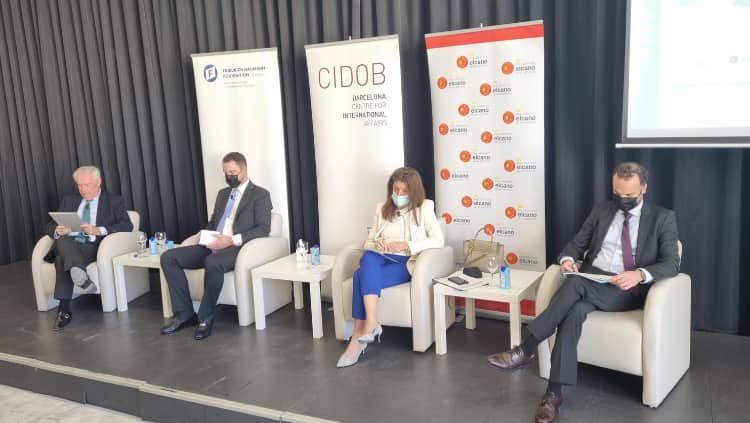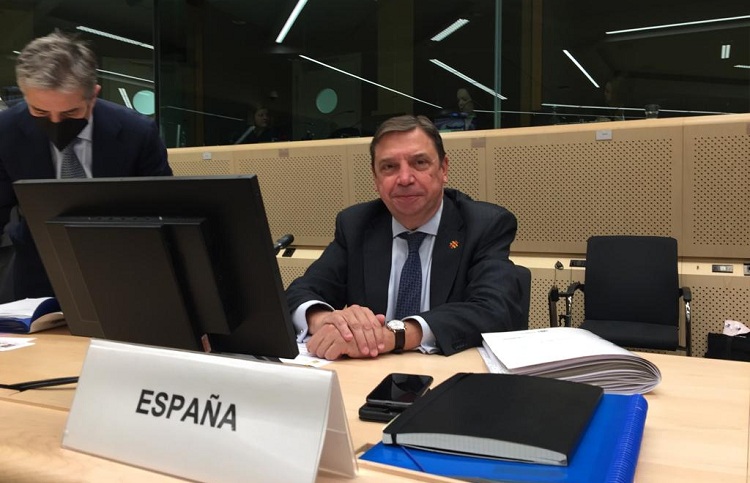Marta Martínez
The importance of Spain going hand in hand with major powers in order for its initiatives on the Mediterranean to be effective was highlighted yesterday at a round table discussion organised in Madrid on the occasion of the presentation of the report “A moment to reflect: Creating Euro-Mediterranean bonds that deliver”, published by the Cidob (Barcelona Centre for International Affairs), the Elcano Royal Institute and the Friedrich Naumann Foundation for Freedom.
The round table, under the title ‘Europe and the Mediterranean: what future in common?’ was introduced by the Director of Elcano, Charles Powell; the Director of the Madrid office of the Friedrich Naumann Foundation, David Henneberger; the Director of Cidob, Pol Morillas; and the State Secretary for Foreign and Global Affairs, Ángeles Moreno, who pointed out the challenges facing the Mediterranean region, including climate change and hybrid threats.
The State Secretary highlighted the challenge that the COVID-19 pandemic has posed for the Mediterranean, multiplying and reproducing its social crises. She insisted, however, that this challenge must be met with solidarity, and recalled that Spain has carried out actions such as the provision of doctors and vaccines to the Mediterranean region. He added that the health crisis should be seen as an opportunity for improvement, especially in digitalisation and its influence on education.
Ángeles Moreno thanked the collaboration of various entities such as the UfM (Union for the Mediterranean) and other initiatives that increase the number of Euro-Mediterranean projects to develop and prosper in areas such as the blue economy, the environment and the development of women.
Taking part in the round table, which was moderated by the El País journalist Ángeles Espinosa, were Haizam Amirah Fernández, Senior Researcher at the Elcano Royal Institute, and Eduard Soler, Senior Researcher at CIDOB,
Fernández pointed out that the Mediterranean is one of the regions in which the European Union has invested most effort, and he referred to the Barcelona Declaration of 1995, in which the countries of the European Union and the 12 countries of the southern Mediterranean attempted to create an area of economic cooperation, common effort and prosperity in the region.
He explained that, despite this intention, the objectives set for 2010 have not progressed sufficiently, and pointed out that the main causes of this have been the economic and financial challenges and difficulties of the international context – uch as Brexit or the anti-authoritarian revolts- and the political will, which, he said, has not been up to the joint commitments.
For his part, Eduard Soler insisted on this idea, stressing that “there is a margin, but time is running out”. For this reason, he proposed, as a strategy for improvement, to think about all the alternative futures that could arise, bearing in mind the situation of the Mediterranean, and to take action to move away from those that are of no interest.
Both scholars emphasised the fact that authoritarianism is the main regime in southern Mediterranean countries, and, as Haizam Amirah Fernández pointed out, this generates a kind of dilemma between preferring democratisation of authoritarian countries, which would imply instability, changes and tensions; or the stability that would come from continuing with an authoritarian regime that is capable of controlling the ever-growing population of the Middle East.
Soler raised the question of to what extent, among the authoritarian countries as a whole, there might be one that understands that the absence of change poses a danger to its own survival.
Participants in the roundtable agreed that cooperation between neighbouring countries in the Mediterranean is as arduous as it is necessary to ensure the region’s prosperity.
With respect to Spain, they stressed that it is a medium-ranking power, with medium capabilities, but is well positioned to have strong allies. For this reason, they agreed that Spanish initiatives will have traction when they go hand in hand with these actors and are aimed at the common interest rather than the national interest.






